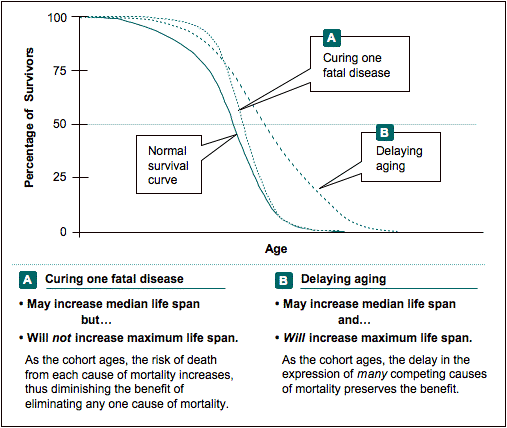
Two of many reasons for this creatures healthy longevity are its low body temperature and slow metabolic rate. They increased the supply of a protein SIRT6 which normally wanes with aging in 250 mice.

Lifespan of mice Marc Vermulst1 Jason H Bielas1 Gregory C Kujoth2 Warren C Ladiges3 Peter S Rabinovitch1 Tomas A Prolla2 Lawrence A Loeb1 Whether mitochondrial mutations cause mammalian aging or are merely correlated with it is an area of intense debate1.
Lifespan of lab mice. Recently two groups have shown that lower levels are as effective at increasing the life span of mice as 40 DR Fig. For each F 1 hybrid the survival curves of males Figure 26-4 and of virgin females were very similar and the mean and maximum lifespans exceeded those for males and virgin females of either parent strain. In five of the six F 1 hybrids more than half of the mice of both sexes lived more than 650 days.
For C57BL6J mice and many other genotypes the upper limit is 24 months but this depends on the onset of disease for the specific genotype. Genotype differences Age ranges for young adult and middle-aged groups are consistent among most inbred strains and F1 hybrids. Sputnik Pavel Lisitsyn A new study in which scientists extended the lifespan of laboratory mice by 23 through a special protein may pave the way for humans to celebrate 120th birthdays its authors said.
If the average lifespan is 80 years in humans and if FGF21s effects from mice translate into humans FGF21 may add approximately 30 years to life he said. But this is speculative at this. Mature adult mice range in age from 3 - 6 months.
The life phase equivalent for humans ranges from 20 - 30 years. Mice can live longer than 2 years in captivity. Wild-derived mice have lived for as many as 4 years in laboratories.
Laboratory mouse strains such as the C57 live for 28 years. Average Mouse Lifespan. As you can see it does not take long for one of these critters to become many but how long do mice normally live.
In the wild the average lifespan of a mouse tends to be about five or six months. If living in ideal conditions they can live for approximately two years. LifeSpan The average lifespan of mice is 2 to 3 years and the process of reproduction is also quick so many generations of mice can be seen in a relatively short period making it easy to know the experiment and its results on different generations.
Israeli scientists increase lifespan of mice by 23 and claim it could work on humans. Jun 1 2021 0. ETH Israeli scientists have boosted the life expectancy of mice by 23 percent in an advance they hope could eventually be replicated in humans.
They increased the supply of a protein SIRT6 which normally wanes with aging in 250 mice. While the average mouse lifespan is only about 12 months outdoors indoors this number can climb to 2 to 3 years. This is because indoors mice arent exposed to harsh environments or natural predators.
Lifespan of mice Marc Vermulst1 Jason H Bielas1 Gregory C Kujoth2 Warren C Ladiges3 Peter S Rabinovitch1 Tomas A Prolla2 Lawrence A Loeb1 Whether mitochondrial mutations cause mammalian aging or are merely correlated with it is an area of intense debate1. Here we use a new highly sensitive assay2 to redefine the. The researchers found that systematically removing a category of living stagnant cells ones which can no longer reproduce extends the lives of otherwise normal mice by 25 percent.
It stays active and enjoys good bone health reproductive success and mental acuity for its lifespan of up to 30 years. Two of many reasons for this creatures healthy longevity are its low body temperature and slow metabolic rate. Lifespan of mice extended by as much as 35 percent.
No adverse effects found Date. February 3 2016 Source. Researchers have shown that senescent cells –.
Giving mice a protein boost can increase their life expectancy by up to 30 per cent and make them less susceptible to cancer according to a new study.